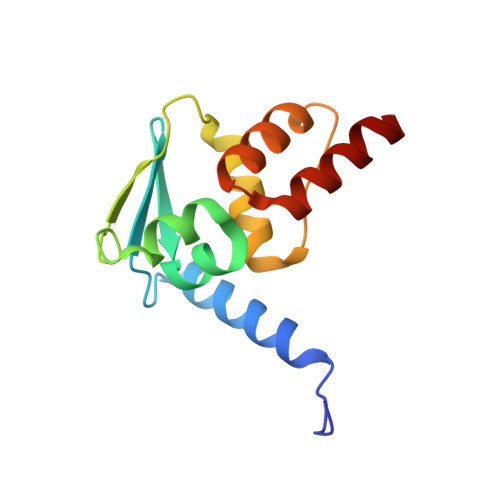Discovery of Pyrazolo[1,5-a]pyrimidine B-Cell Lymphoma 6 (BCL6) Binders and Optimization to High Affinity Macrocyclic Inhibitors.
McCoull, W., Abrams, R.D., Anderson, E., Blades, K., Barton, P., Box, M., Burgess, J., Byth, K., Cao, Q., Chuaqui, C., Carbajo, R.J., Cheung, T., Code, E., Ferguson, A.D., Fillery, S., Fuller, N.O., Gangl, E., Gao, N., Grist, M., Hargreaves, D., Howard, M.R., Hu, J., Kemmitt, P.D., Nelson, J.E., O'Connell, N., Prince, D.B., Raubo, P., Rawlins, P.B., Robb, G.R., Shi, J., Waring, M.J., Whittaker, D., Wylot, M., Zhu, X.(2017) J Med Chem 60: 4386-4402
- PubMed: 28485934
- DOI: https://doi.org/10.1021/acs.jmedchem.7b00359
- Primary Citation of Related Structures:
5N1V, 5N1X, 5N1Z, 5N20, 5N21 - PubMed Abstract:
Inhibition of the protein-protein interaction between B-cell lymphoma 6 (BCL6) and corepressors has been implicated as a therapeutic target in diffuse large B-cell lymphoma (DLBCL) cancers and profiling of potent and selective BCL6 inhibitors are critical to test this hypothesis. We identified a pyrazolo[1,5-a]pyrimidine series of BCL6 binders from a fragment screen in parallel with a virtual screen. Using structure-based drug design, binding affinity was increased 100000-fold. This involved displacing crystallographic water, forming new ligand-protein interactions and a macrocyclization to favor the bioactive conformation of the ligands. Optimization for slow off-rate constant kinetics was conducted as well as improving selectivity against an off-target kinase, CK2. Potency in a cellular BCL6 assay was further optimized to afford highly selective probe molecules. Only weak antiproliferative effects were observed across a number of DLBCL lines and a multiple myeloma cell line without a clear relationship to BCL6 potency. As a result, we conclude that the BCL6 hypothesis in DLBCL cancer remains unproven.
- IMED Oncology and Discovery Sciences, AstraZeneca , 310 Cambridge Science Park, Milton Road, Cambridge, CB4 0WG, U.K.
Organizational Affiliation:

















